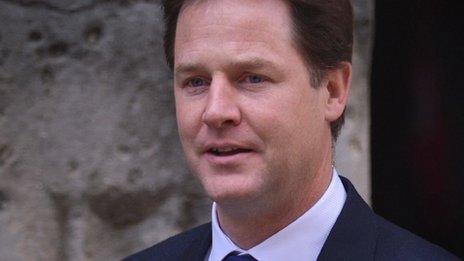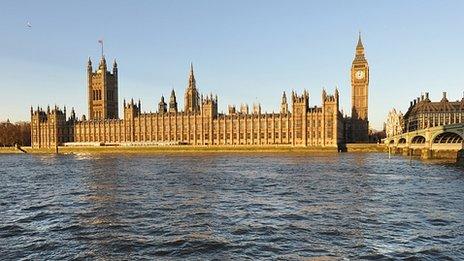Recall plan for MPs 'is a stitch-up'
- Published
Zac Goldsmith says the government recall plan is "worse than where we are today"
The proposed "recall" rules to allow errant MPs to be ousted have been criticised as an "absolute stitch up".
Tory MP Zac Goldsmith said the power to "recall" an MP should lie in the hands of voters - not a committee of MPs.
Under current plans, a petition would only be triggered if an MP received a jail term, or if a committee of MPs ruled that they should face recall.
PM David Cameron said the aim was to avoid "vexatious attempts" to unseat MPs who had done nothing wrong.
The issue is back on the agenda following new lobbying allegations against an MP and three peers at the weekend.
'MPs judging MPs'
But campaigners say the plans under consideration, external are too narrow and put the decision to recall MPs into the hands of a parliamentary committee, not voters.
Mr Cameron was pressed on the issue by Conservative backbencher Douglas Carswell and Labour MP John Woodcock at Prime Minister's Questions on Wednesday.
Mr Carswell told him: "Instead of a proposal that would mean politicians sitting in judgment of politicians, can you make it clear that a recall mechanism will include an actual recall ballot, a yes/no chance for constituents to make the final decision before an MP is removed?"
Mr Woodcock asked the prime minister: "Do you seriously plan to give a parliamentary committee the right to block the public's chance to vote on recalling a convicted MP?"
The prime minister replied that he believed it was right that there be "some sort of censure" by the Commons first "in order to avoid vexatious attempts to get rid of MPs who are doing a perfectly reasonable job".
Prison sentence
He said MPs could "discuss and debate" the plans, adding: "Of course you want to have a process whereby constituents through a petition can call for the recall of their MP.
"But because the main way we throw MPs out of Parliament is at an election, there should be a cause for that recall to take place.
"That is why we have a standards and privileges committee, that is why it now has outside members, that is why that committee has the power to suspend MPs and, indeed, to expel them."
Under current rules, MPs can only be removed from their seats between elections if they are convicted of a crime resulting in a prison sentence of 12 months or longer.
The idea of bringing in new powers dates back several years, to when details of MPs' expenses abuse first began to emerge.
They were included in the 2010 coalition agreement in instances where an MP was "found to have engaged in serious wrongdoing" and where 10% of his or her electorate signed a petition calling for a by-election.
Conservative Zac Goldsmith told the BBC what was being proposed would actually make things worse - by concentrating power in the hands of a Commons committee and giving only a "very narrow definition of serious wrongdoing".
He said maverick or independent MPs would fall foul of a committee chosen by party whips: "We would be better off not having any recall at all, than adopting what they are putting forward. It's an absolute stitch-up."
However the Labour MP Fabian Hamilton, who sits on the Commons Political and Constitutional Reform Committee, told BBC Newsnight: "I think the scope for mischief is enormous.
"I think there are groups that are very vocal, very well organised, have a particular agenda, that would constantly be trying to remove the Member of Parliament that was elected by a large percentage of the electorate."
- Published4 June 2013
- Published28 June 2012

- Published19 April 2012
